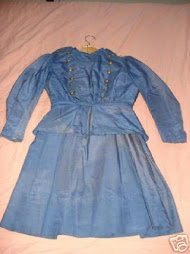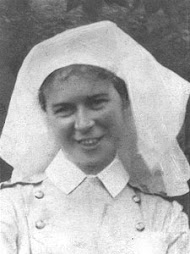There are few records with which we can trace the life of Nursing Sister Lenna Mae Jenner. What we do know—according to her military service file—was that she was born on November 17, 1889 in Brookfield, Nova Scotia to British-born John Jenner and his wife Mary (nee MacIntyre). She had two older siblings, Hugh and Ada.
A Hard-Working Family
John Jenner was ordained as a Baptist minister in Brookfield, Queen’s County, Nova Scotia in 1889, the year that his daughter Lenna was born. In 1891, he graduated from Acadia College. John earned an MA from Newton Seminary, Massachusetts in 1893. According to the 1900 American census, the Jenners were living in Springfield, where John was serving West Merrick Baptist Church. In October 1901, the family moved to Halifax, where he accepted a call to North Baptist Church.
No one in the family followed John into the ministry. However, his children did inherit his commitment to hard work. Hugh became a bookkeeper and sometime between 1910 and 1914, Lenna Mae enrolled in nursing school. She may have attended the two year program at the Victoria General Hospital School of Nursing in Halifax where students were taught everything from making beds to preparing patients for the operating room.
War Changes Everything
The First World War began in August 1914. That fall, Hugh Jenner joined the Canadian Expeditionary Force and was posted overseas. In April 1917, Lenna began working in a military hospital in Canada. The Canadian Nurse and Hospital Review of March 1918 reported that “Nursing Sisters Coates and Jenner, of the Station Hospital are leaving for the Military Hospital, Kentville, N. S.” There were many “station hospitals” in Canada, but Lenna may have served in the one in Halifax. The military hospital in Kentville was at the Aldershot training camp. It was probably from there that Lenna Mae was posted overseas in June 1918.
Lenna’s pre-posting medical declared that her health was good. This, despite the fact that she had already been working for fourteen months and her most recent assignment had been at a camp where roughly 7,000 soldiers were trained at any one time. In Kentville, she worked 12-hour-days and was exposed to illnesses such as tuberculosis and influenza.
Casualty of War
In Britain, Lenna was assigned to work at the West Cliff Canadian Eye and Ear Hospital in Folkestone. In October 1918, just two months after her arrival overseas, she complained to the Matron-in-Chief “of loss of strength and weight also of pain in the left side on exertion.” Lenna was sent to a private nursing home in London. From there she was admitted to Clarence House, North Finchley, for an abdominal operation for “tubercular peritonitis.” She died of septicemia on December 12, two months after she first became ill.
The medical team was probably not paying adequate attention to Lenna’s symptoms, according to historian and nurse Katherine Dewar. “The peritoneum is the covering of the abdominal cavity and I would assume that the patient had TB somewhere else in her body and it spread via the blood stream (septicemia) to the peritoneum…I would say that someone was already run down from chronic illness when this occurred.” Lenna likely contracted tuberculosis in the crowded conditions at Aldershot Camp, or in the demanding confines of the Eye and Ear Hospital.
No Tribute to the Female Fallen
Family members were always invited to provide an appropriate quote or saying to adorn the military headstones of their loved ones. There is no such quote on Lenna Mae Jenner’s headstone. In life and in death, indifference seems to have marked the way that others treated the life and service of this brave nursing sister.
Wednesday, February 25, 2015
Subscribe to:
Post Comments (Atom)






















No comments:
Post a Comment